The United Nations, in its 1992 agreement, espoused the nonages protestation, which defines nonages based on their public or ethnical, artistic, religious, and verbal identity and mandates that States should protect their existence. There is no internationally agreed-upon definition of which groups constitute minorities. It is frequently emphasized that the recognition of a minority is a matter of fact, and any definition must encompass both objective factors (such as shared race, language, or religion) and subjective factors (including individuals identifying themselves as members of a minority).
The challenge of establishing a universally accepted definition lies in the diverse circumstances in which minorities exist. Some minorities live in well-defined areas, distinct from the majority population, while others are scattered throughout a country. Some minorities have a strong sense of collective identity and recorded history, while others retain only a fragmented notion of their common heritage.
The term “minority” in the United Nations human rights system generally refers to public or ethnic, religious, and linguistic minorities, in accordance with the United Nations Minorities Declaration. All countries have one or more minority groups within their borders, characterized by their distinct public, ethnical, linguistic, or religious identity, which differs from that of the majority population.
Based on the experiences of minority communities worldwide and the provisions of the United Nations Minorities Declaration and other international norms related to minority rights, the following major issues can be identified: survival and recognition of minority existence, preservation and protection of minority identity, equality and non-discrimination, and meaningful and effective participation.
In 1992, the General Assembly of the United Nations adopted the United Nations Minorities Declaration by resolution 47/135. It serves as the primary reference document for minority rights, granting individuals belonging to minorities the following rights: the protection by States of their existence and their public or ethnical, artistic, religious, and linguistic identity (Article 1); the right to enjoy their own culture, practice their own religion, and use their own language in private and in public (Article 2(1)); the right to participate effectively in cultural, religious, social, economic, and public life (Article 2(2)); the right to participate effectively in decisions affecting them on the national and local levels (Article 2(3)); and the right to establish and maintain their own associations (Article 2(4)).
Now, let’s examine some recent incidents from around the world that have negatively affected minorities. Starting with our own country, Pakistan, on August 16, a violent mob of hundreds ransacked and torched nearly two dozen churches, attacked the residences of members of the Christian community, and the Office of the local Assistant Commissioner in Jaranwala. According to estimates compiled by Faisalabad’s District, at least 22 churches ransacked by the mob suffered damages totaling 29.1 million, while 91 houses, which bore the brunt of the violence, suffered losses of 38.5 million. As per police and local sources, the violence erupted after some locals alleged that several desecrated pages of the Holy Quran were found near a house at Cinema Chowk in Jaranwala, where two Christian brothers resided.
Another recent incident is from India, specifically Manipur. At least 150 people have been killed in clashes between the Meitei and Kuki ethnic groups, which have engulfed India’s northeastern state of Manipur, bordering Myanmar. The violence began in Churachandpur, a city just south of the state capital Imphal, on May 3, following a Kuki-led ethnic solidarity march in ten of the state’s sixteen districts. As the Meitei organized counter-protests and confrontations, clashes spread across Manipur. Women were part of some of the mobs, and in some cases, they blocked authorities trying to intervene to shield Meitei men conducting attacks.
Thousands have been injured, and over 60,000 have been displaced in the violence, with more than 12,000 fleeing to neighboring Mizoram state. Hundreds of houses, places of worship, and vehicles have been vandalized, and thousands of weapons have been stolen from government depots. Acts of violence and attacks continue unabated.
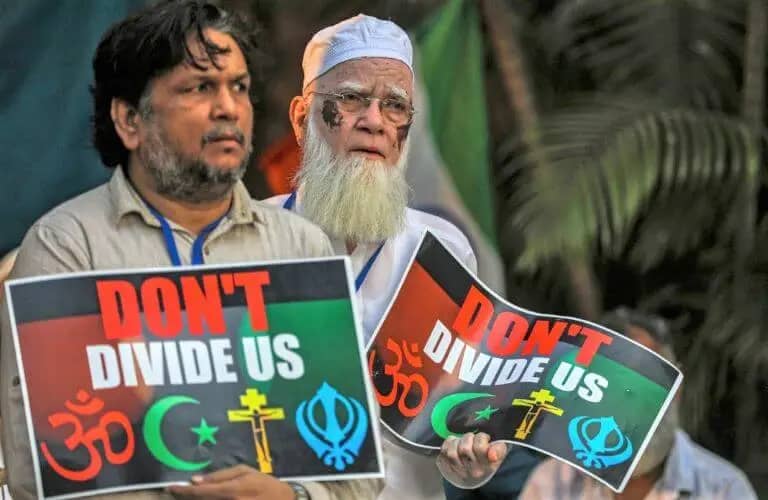
Numerous cases of sexual violence by Meitei men, soldiers, and militants against Kuki women have also been reported, indicating the widespread use of sexual violence as part of the ethnic conflict. The footage of these events sparked outrage throughout India, with protests organized in major cities. Responding to questions from a TV news channel, Manipur Chief Minister Biren Singh conceded that there had been “hundreds of similar cases.”
Continuing this discussion, we turn our attention to Europe. Sometimes, the perceived importance of safeguarding religious freedom can overshadow the need to protect other rights. For many women from religious minorities around the world, this is a common experience. Using women’s rights as a benchmark helps us assess whether countries are adequately addressing the needs of religious minorities from both a religious and gender perspective.
In recent times, Canada has grappled with the question of whether and how Sharia courts could be incorporated into the country’s legal system. While some Muslim women may have wanted to use non-mainstream legal options such as Sharia courts to resolve their issues, others, like the Canadian Council of Muslim Women, opposed the introduction of Sharia law. Social pressure from religious groups ranges from individual actions to mob violence. This pressure can also include the publication of derogatory documents or cartoons targeting a particular group. It encompasses property damage, detentions or rapes, forced displacement, physical assault, and the killing of members of religious groups by individuals or social groups.
The Middle East and North Africa have consistently experienced the highest levels of conflict in this regard (sub-Saharan Africa had the highest levels in 2010). In contrast, the Americas have the lowest levels of such incidents among all regions, but they have also witnessed the most significant increase in this type of hostility since 2007. In Brazil, incidents of anti-Semitic and anti-Muslim sentiment occurred in 2017, along with attacks targeting Afro-Brazilian communities. In the state of Sao Paulo, arsonists burned down an Afro-Brazilian temple in September, one of eight attacks against Afro-Brazilian targets in the state that month.
It is our collective responsibility, as individuals, parents, and global citizens, to combat racism and xenophobia wherever we encounter them. Here are five ways, as suggested by UNICEF USA:
1. Celebrate Other Cultures:
Show your support for different ethnic groups in your community by attending, promoting, or assisting in funding events organized by cultural associations and places of worship that bring people together, such as festivals, film screenings, guest lectures, language classes, and cultural celebrations. Involve your children in these activities. Additionally, support businesses run by immigrants and explore various culinary traditions, clothing styles, and films from different countries with your children. Read stories that celebrate diversity.
2. Confront Bias and Hate Speech:
Labeling and stereotyping are cruel and counterproductive. There has been a troubling increase in hate speech among Americans and Europeans in recent times, often targeting immigrants and minority groups for their countries’ challenges. Speak up and let individuals know that stereotyping is not acceptable. If you hear someone making a racist joke, let them know it is inappropriate. Encourage your children to do the same. Using “humor” to perpetuate harmful ideas and reinforce negative stereotypes is not funny. Consider writing a letter to the editor or leaving a comment on social media to let others know that prejudiced remarks are unkind and unwarranted.
3. Teach Children Empathy and How to Discuss Differences:
Prejudice and hate are learned behaviors, and they can be unlearned. Children absorb attitudes from adults around them, as well as from the media, books, and their peers. Therefore, set a positive example. The process of countering bias with empathy begins at an early age. Discussing differences does not increase prejudice in children. Ensure that children understand that we are all humans and have the right to feel safe and valued. Name-calling is uncivilized and should not be tolerated.
4. Stand Up for Those Facing Harassment, If Safe to Do So:
When the public shows solidarity with immigrants and marginalized groups, bullies lose their power. If you witness someone being harassed or physically attacked, intervene if it is safe to do so. Make your presence as a supporter known. Make eye contact with the person being targeted and ask if they want assistance. Do not escalate the situation. Verbal and physical abuse is wrong and should not be tolerated. All individuals deserve to be treated with respect and humanity.
5. Support Human Rights Organizations Like UNICEF:
UNICEF has tirelessly advocated for children’s rights worldwide for 75 years and recognizes that children should be seen as children first and foremost. During this global crisis, it is more important than ever that we stand in solidarity with one another. Human rights are a collective commitment made by all nations, including those facing challenges. Children from all ethnic backgrounds, especially those affected by violence, war, and poverty, need our support wherever they are. Every child deserves to be treated with dignity and empathy and to grow up in a safe and nurturing environment.
To sum up, our shared responsibility is to combat discrimination and xenophobia, working together to uphold and protect the rights and identities of minorities.







Useful article. Got the crucial insight of the global spectrum where the problems exist